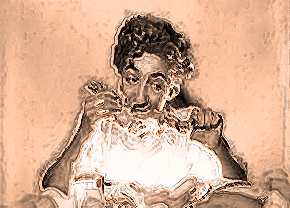Why We Don't Celebrate Halloween
Sunday, October 22, 2006

For the next two weeks, if you've been directed here by me because you just don't get our weirdness, please read the entire post.
This post is for all of those people out there who simply cannot believe we don't pay $20 for a cheap costume, then let our small children browbeat our neighbors into giving them candy, so they can gorge themselves and end up grounded for a week due to their poor behavior.
Our family does not celebrate Halloween. We usually celebrate All Saint's Day, a Catholic holiday that occurs on November 1. This year we won't, as our local church only has 7 children in attendance, 6 of whom belong to me, and I'm not planning the party. The Novus Ordo parish has more children, but is holding a Halloween party and doing nothing special for All Saint's Day.
Why we don't celebrate Halloween:
1. We are not pagans. I know it sounds flippant, but Halloween did originate as a Gaelic pagan festival, and that's why All Saint's Day is on Nov. 1. The Church, in her wisdom, recognized that the culture was used to having a big celebration around that time of year, and decided to give the new Christians something good to actually celebrate. Originally called Samhain, the name Halloween, I'm sure you've heard, has derived from All Hallow's Eve - the night before All Hallow's day, aka All Saint's Day.
2. Sure, you say, but it's no longer a pagan holiday, but a secular American tradition. Well, no, it's not. No matter how you try to deny it, witches, ghosts, vampires, and being scared all pervade the Halloween celebration. Women's magazines post elaborate recipes to make candied witche's brooms (you've got to see this, BTW - Martha Stewart would be proud!) and ghost lollipops. Fake vampire teeth and blood are sold by the bagful to give to trick-or-treaters. You can buy chocolates in the shape of dismembered body parts. Superstitions are dragged out and celebrated, with black cats taking the center stage. Not only is superstition wrong and specifically forbidden by God, the underlying, subtle message is that some of God's creation is intrinsically bad or unlucky. (Poor cat. Too bad God didn't like you and made you black!) That a broken mirror rules your destiny. Adults can see past this (usually), but children are much more literal
3. The atmosphere that pervades Halloween is not one of "family values". There is no denying that many feel freed by social constraints on this night, free to be daring, wild, different. In this sense, it is much like Mardi Gras. You can do things on Halloween that you would never do in real life, whether it is participate in Fear Factor type dares at a party or TPing the neighbor's tree.

4. The costumes are often inappropriate. Young girls dress in bras and pantaloons or strapless gowns to be Disney Princesses. French maids abound, frolicking in the street. Bratz dolls appear on your doorstep, complete with glittery lip gloss to compliment their diapers. The most basic costumes, whether they be fairies or pirates, are 'sexed' up for the girls. The boys generally appear as serial killers, rubber weapons dripping in blood, ghosts, zombies, ghouls. Or maybe they dress up like their favorite sports hero, the one who beats his wife or evades taxes. Children imitate and fantasize about being Christina Aguilera, witches, or psychotic individuals. Is this good character training?
For less than $40, you can dress your 6 yr. old like a working girl!
5. Halloween is not respectful of the dead. A corporal work of mercy is to bury the dead. Respect for the dead is very, very important in Catholic culture, as the body was once the temple of the Holy Spirit and often contained Christ himself in the form of the Eucharist. Mocking the dead has no place in Christianity, whether it be dancing skeletons, zombies, or fake dismembered body parts hanging from a car trunk. What are we teaching our children - that it's fun to make fun of corpses?
6. "Trick or Treat" is not a good thing for children to say. Sure, it seems harmless, but underneath, it is blackmail. Give me candy, or I'll do something you don't like. I don't think it is a good idea to tell our kids it's okay to speak to adults that way, even if it is only one day a year. (Remember, Honor thy Father and Mother? Means every day, all the time. Not 364 days a year with one day off.) Also, there is the additional problem of slightly older children actually performing tricks, egging mailboxes, tp-ing cars, ringing doorbells and running. Authorities, whether parental or official, often turn a blind eye to such harmless pranks on this night. The fact remains, though, that these are sinful activities and parents are responsible for helping their children avoid sin.

7. The candy. Gluttony is one of the seven deadly sins. Gorging on candy, fighting over MINE MINE MINE, selfishness, and self-entitlement abound on this night. The alternative is worse - parcel out one or two pieces until you run out around Christmastime, for that extra fun time at the dentist next year.
I have no problem with scarecrows, indian corn, harvest themes, or even jack-o-lanterns (provided they are carved with a cheerful grin to welcome guests and not mutilated with fangs and a 666 on the head). I have a problem with the evil atmosphere that pervades our culture in October.
Yes, my children are horribly deprived. So what.
Tags: Catholic, Family Life, Homeschooling, Mama Says
posted by Milehimama @ Mama Says at 10/22/2006 11:28:00 AM | Permalink |
|








